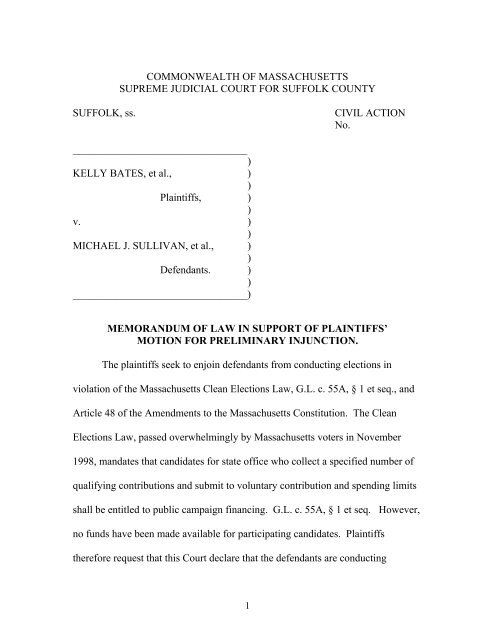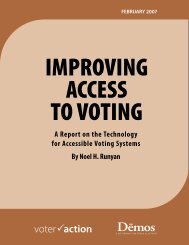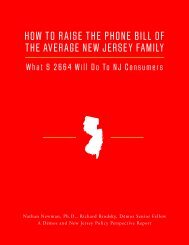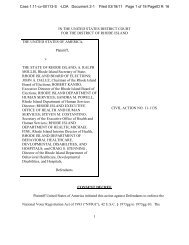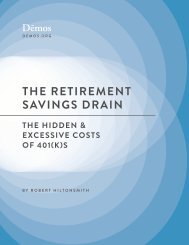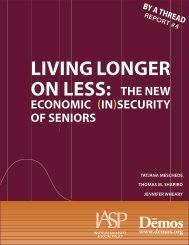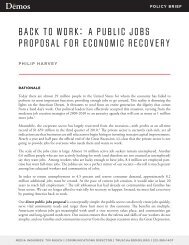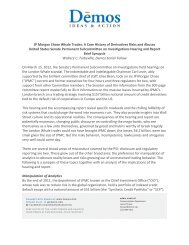Motion for Preliminary Injunction - Demos
Motion for Preliminary Injunction - Demos
Motion for Preliminary Injunction - Demos
You also want an ePaper? Increase the reach of your titles
YUMPU automatically turns print PDFs into web optimized ePapers that Google loves.
COMMONWEALTH OF MASSACHUSETTS<br />
SUPREME JUDICIAL COURT FOR SUFFOLK COUNTY<br />
SUFFOLK, ss.<br />
CIVIL ACTION<br />
No.<br />
_________________________________<br />
)<br />
KELLY BATES, et al., )<br />
)<br />
Plaintiffs, )<br />
)<br />
v. )<br />
)<br />
MICHAEL J. SULLIVAN, et al., )<br />
)<br />
Defendants. )<br />
)<br />
_________________________________)<br />
MEMORANDUM OF LAW IN SUPPORT OF PLAINTIFFS’<br />
MOTION FOR PRELIMINARY INJUNCTION.<br />
The plaintiffs seek to enjoin defendants from conducting elections in<br />
violation of the Massachusetts Clean Elections Law, G.L. c. 55A, § 1 et seq., and<br />
Article 48 of the Amendments to the Massachusetts Constitution. The Clean<br />
Elections Law, passed overwhelmingly by Massachusetts voters in November<br />
1998, mandates that candidates <strong>for</strong> state office who collect a specified number of<br />
qualifying contributions and submit to voluntary contribution and spending limits<br />
shall be entitled to public campaign financing. G.L. c. 55A, § 1 et seq. However,<br />
no funds have been made available <strong>for</strong> participating candidates. Plaintiffs<br />
there<strong>for</strong>e request that this Court declare that the defendants are conducting<br />
1
elections in violation of the Clean Elections Law and Article 48, and order that<br />
any and all candidates who qualify <strong>for</strong> public campaign financing must receive the<br />
full amounts to which they are entitled.<br />
The Clean Elections Law promises that candidates who voluntarily limit<br />
their contributions and spending, and gather sufficient qualifying contributions,<br />
will be entitled to public campaign funding in the primary and general elections.<br />
G.L. c. 55A, §§ 7 and 11. Relying upon this, the candidate plaintiffs are in the<br />
process of qualifying <strong>for</strong> public financing and continue to limit their spending and<br />
<strong>for</strong>go contributions over $100, as the law requires, while non-participating<br />
candidates may spend unlimited amounts and are free to accept larger<br />
contributions.<br />
The lack of public funding jeopardizes the ability of the plaintiffs and<br />
others seeking public financing to run an effective campaign <strong>for</strong> office. See<br />
affidavits of candidate plaintiffs, Plaintiffs’ Exhibits at Tab 1. Absent judicial<br />
relief, the lack of funding will cause some candidates to opt out of Clean Elections<br />
participation and seek large private contributions, contrary to their desires. Other<br />
candidates, unable or unwilling to seek large private contributions, will withdraw<br />
from the elections entirely, and still other potential candidates considering a run<br />
from office will be deterred from the endeavor by the Commonwealth’s failure to<br />
guarantee the funding promised by the new law.<br />
The voters of Massachusetts overwhelmingly supported the Clean Elections<br />
Law and yet their votes are rendered null by the failure to fund and implement the<br />
2
law. The fundamental right of citizens to vote <strong>for</strong>, and enact, laws through the<br />
initiative process will be eviscerated unless defendants are ordered to implement<br />
the Clean Elections Law immediately. Furthermore, the failure to implement the<br />
Clean Election Law threatens imminent harm to voters by depriving them of the<br />
ability to support, and vote <strong>for</strong>, the candidates of their choice.<br />
The defendants’ conduct of elections without funding <strong>for</strong> the Clean<br />
Elections Law violates Article 48 of the Amendments to the Massachusetts<br />
Constitution, which requires that laws passed through voter initiative be given full<br />
effect. “Legislative power shall continue to be vested in the general court; but the<br />
people reserve to themselves the popular initiative, which is the power of a<br />
specified number of voters to submit constitutional amendments and laws to the<br />
people <strong>for</strong> approval or rejection….” Art. 48, Initiative and Referendum Pt. 1 § 1.<br />
Article 48 further requires that if a law approved by the voters is not repealed by<br />
the legislature, the Commonwealth must appropriate “such money as may be<br />
necessary to carry such law into effect.” Art. 48, Init. Pt. 2 § 2.<br />
While this violation threatens immediate, irreparable harm to plaintiffs, an<br />
injunction requiring the defendants to comply with the Clean Elections Law will<br />
cause the Commonwealth no substantial injury. Instead, compliance with the<br />
Clean Elections Law will further the public interest by reducing the candidates’<br />
reliance on special-interest donors, making elections more competitive, and<br />
enhancing public confidence in the integrity of the electoral process.<br />
3
STATEMENT OF FACTS<br />
In November 1998, Massachusetts voters overwhelmingly approved the<br />
Clean Elections Law pursuant to the provisions of Article 48 of the Amendments<br />
to the Massachusetts Constitution. Approximately two thirds voted <strong>for</strong> it, and it<br />
passed in every legislative district of the state. The law, enacted as Chapter 395 of<br />
the Acts of 1998 and codified as Chapter 55A of the General Laws, mandates<br />
public funding <strong>for</strong> qualified candidates who choose to participate.<br />
The Clean Elections Law sets <strong>for</strong>th procedures and criteria <strong>for</strong> participating<br />
candidates <strong>for</strong> state office in Massachusetts to become eligible <strong>for</strong> public<br />
campaign funding, by signing a declaration of intent and then raising a minimum<br />
number of qualifying contributions and signed supporting <strong>for</strong>ms during a<br />
“qualifying period.” G.L. c. 55A, §§ 1 and 4. The qualifying period <strong>for</strong> statewide<br />
offices in the 2002 elections is August 1, 2001 to August 27, 2002; <strong>for</strong> other<br />
offices it is January 1, 2002 to May 28, 2002. G.L. c. 55A, § 1; G.L. c. 53, § 10.<br />
During the election cycle, all participating candidates must refuse any<br />
monetary contributions over $100, and may not accept aggregate contributions in<br />
the primaries over limits ranging from $3,300 <strong>for</strong> State Representative candidates<br />
to $322,000 <strong>for</strong> candidates <strong>for</strong> Governor, G.L. c. 55A, § 9. 1<br />
The aggregate<br />
1 All contribution and spending limits, and public financing amounts, are as<br />
adjusted <strong>for</strong> inflation on February 1, 2001, pursuant to G.L. c. 55A, § 13. These<br />
figures, attached at Tab 2, are available on the OCPF web site, at<br />
http://www.state.ma.us/ocpf/celimits.pdf.<br />
4
contributions permitted in the general election range from $3,200 (State<br />
Representative) to $164,600 (Governor). G.L. c. 55A, § 9. 2<br />
Finally, candidates<br />
seeking public funding must also abide by expenditure limits in the primary<br />
campaign ranging from $19,500 (State Representative) to $1,944,100 (Governor),<br />
and limits in the general election campaign ranging from $12,900 (State<br />
Representative) to $1,300,100 (Governor). G.L. c. 55A, § 6. For the 2001-2002<br />
election cycle, all limits apply as of March 31, 2001.<br />
Candidates who raise sufficient qualifying contributions, abide by the<br />
contribution and spending limits, and otherwise comply with the law, must be<br />
certified by the Director of the Office of Campaign and Political Finance (OCPF)<br />
and are then entitled to receive distributions from the Massachusetts Clean<br />
Elections Fund (the “Fund”). G.L. c. 55A, §§ 5 and 7. In addition to the base<br />
level of funds allocated to certified candidates, each candidate is also entitled to<br />
matching funds when a non-participating opponent exceeds the primary or general<br />
election expenditure limits, until the candidate’s total public financing reaches<br />
twice the relevant expenditure limit. G.L. c. 55A, § 11.<br />
During the 2001-2002 primary election, certified candidates are entitled to<br />
the following amounts: Governor, $1,622,100 in base funds, up to $2,266,100<br />
matching funds, totaling up to $3,888,200 per candidate; Lieutenant Governor,<br />
2 Participating candidates must also limit in-kind contributions from each<br />
individual or political committee. G.L. c. 55A, § 10.<br />
5
$414, 200 base, up to $559,200 matching, $973,400 total; Attorney General or<br />
Treasurer, $389,300 base, up to $583,900 matching, $973,200 total; Auditor or<br />
Secretary of the Commonwealth, $129,800 base, up to $194,800 matching,<br />
$324,600 total; Governor’s Councilor, $20,500 base, up to $31,300 matching,<br />
$51,800 total; State Senator, $46,500 base, up to $70,300 matching, $116,800<br />
total; State Representative, $16,200 base, up to $22,800 matching, $39,00 total.<br />
Distribution of one half of the primary funding is due within five business days of<br />
certification, and the remainder is due to candidates with an opponent who will<br />
appear on the ballot in the primary within five business days after the end of the<br />
qualifying period. G.L. c. 55A § 8.<br />
During the 2001-2002 general election, certified candidates are entitled to<br />
the following amounts: Governor, $1,135,500 base, up to $1,464,700 matching,<br />
$2,600,200 total; Lieutenant Governor, $275,800 base, up to $373,000 matching,<br />
$648,800 total; Attorney General or Treasurer, $259,500 base, up to $389,300<br />
matching, $648,800 total; Auditor or Secretary of the Commonwealth, $86,500<br />
base, up to $129,700 matching, $216,200 total; Governor’s Councilor, $14,100<br />
base, up to $20,700 matching, $34,800 total; State Senator, $31,400 base, up to<br />
$46,600 matching, $78,000 total; State Representative, $9,700 base, up to<br />
$16,100 matching, $25,800 total.<br />
Despite the clear mandate of the Clean Elections Law, no money has been<br />
appropriated <strong>for</strong> disbursement by the Fund. Nevertheless, candidates who wish to<br />
remain eligible <strong>for</strong> financing must abide by the Clean Election Law’s contribution<br />
6
and spending limits, and must expend the time and resources necessary to gather<br />
qualifying contributions. 3<br />
At the same time, the candidates’ non-participating<br />
opponents are free to accept individual contributions up to $500 per calendar year,<br />
or $1000 <strong>for</strong> the 2001-2002 cycle. G.L. c. 55 § 7A.<br />
The candidate plaintiffs include Warren Tolman, who is seeking the<br />
Democratic Party nomination <strong>for</strong> Governor; Jill Stein, who is seeking the Green<br />
Party nomination <strong>for</strong> Governor; Sarah Cannon Holden, who is seeking the<br />
Democratic nomination <strong>for</strong> Lieutenant Governor; Evan Slavitt, who is seeking the<br />
Republican nomination <strong>for</strong> Attorney General; James O’Keefe, who is seeking the<br />
Green Party nomination <strong>for</strong> Treasurer; Stephen Spain, who is seeking the<br />
Democratic nomination <strong>for</strong> State Senate in the Third Middlesex District; and<br />
Douglas Petersen, who is seeking the Democratic nomination <strong>for</strong> State<br />
Representative in the Eighth Essex district. All are in the process of qualifying <strong>for</strong><br />
public campaign financing. See Affidavits, Plaintiffs Exhibits Tab 1.<br />
The voter plaintiffs supported enactment of the Clean Elections Law, and<br />
wish to support publicly funded candidates <strong>for</strong> elected office. These plaintiffs<br />
include four who were among the first ten signers of the petition to place the law<br />
on the ballot: Brian Corr, Marc D. Draisen, Arnold S. Hiatt, and John W. Sears.<br />
The other voter plaintiffs are Kelly Bates, Ron Bell, Derek Bok, Richard Elrick,<br />
Robert A. Feuer, Kathleen E. Grady, Frank N. Jones, Sumner Z. Kaplan, Giovanna<br />
3 Statewide candidates were permitted to gather qualifying contributions as of<br />
August 1, 2001, while <strong>for</strong> other candidates the qualifying period does not begin<br />
7
Negretti, Galen Nelson, William O’ Connell, Gibran X. Rivera, David C. Robbins,<br />
John J. Templeton, Nancy Turner, and Ernest Winsor.<br />
The organizational plaintiffs worked actively to place the Clean Elections<br />
Law on the ballot and to secure its passage. Massachusetts Voters <strong>for</strong> Clean<br />
Elections (“Mass Voters”) is a nonpartisan, nonprofit citizen ef<strong>for</strong>t to reduce the<br />
influence of private money in the electoral process and encourage greater<br />
competition in statewide and legislative elections. It was the principal proponent<br />
of the ballot initiative, and had over 6,000 volunteers working to enact the law by<br />
gathering signatures and conducting public education. Common Cause<br />
Massachusetts is an affiliate of a thirty-year-old nonprofit, nonpartisan citizen's<br />
lobbying organization promoting open, honest, and accountable government.<br />
With over 10,000 members, Common Cause Massachusetts was a major<br />
proponent of the Clean Elections Law; its members worked to secure the law’s<br />
passage by gathering signatures and through public advocacy.<br />
The Massachusetts Republican State Committee and the Massachusetts<br />
Green Party are recognized political parties in the State of Massachusetts.<br />
Candidates are seeking the nominations of these parties <strong>for</strong> statewide offices, State<br />
Senator and State Representative. Numerous candidates from each of these parties<br />
are in the process of qualifying <strong>for</strong> public campaign financing.<br />
until January 1, 2002. G.L. c. 55A, § 1.<br />
8
LEGAL ARGUMENT<br />
I. <strong>Preliminary</strong> <strong>Injunction</strong> Standard<br />
In considering a motion <strong>for</strong> a preliminary injunction, a court must first<br />
evaluate in combination the moving party’s claim of injury and chance of success<br />
on the merits. Packaging Industries Group, Inc. v. Cheney, 380 Mass. 609, 617,<br />
405 N.E.2d 106 (1980). If the court is convinced that the failure to issue an<br />
injunction would subject the moving party to a substantial risk of irreparable harm,<br />
it balances this risk against the risk of harm which granting the injunction would<br />
create <strong>for</strong> the opposing party. Id. A preliminary injunction should issue where<br />
the balance of the risks favors the moving party. Id.<br />
II. Plaintiffs Are Likely to Succeed on the Merits<br />
Article 48 of the Massachusetts Constitution declares the right of citizens to<br />
propose and enact laws governing the Commonwealth. “Legislative power shall<br />
continue to be vested in the general court; but the people reserve to themselves the<br />
popular initiative, which is the power of a specified number of voters to submit<br />
constitutional amendments and laws to the people <strong>for</strong> approval or rejection ….”<br />
Art. 48, Initiative and Referendum Pt. 1 § 1.<br />
To ensure that laws passed by voter initiative are given full effect, Article<br />
48 demands that such laws be fully funded. While the legislature may amend or<br />
repeal a law approved by the people, Art. 48, Initiative and Referendum Pt. VI, if<br />
9
it does not do so, the legislature “shall raise by taxation or otherwise and shall<br />
appropriate such money as may be necessary to carry such law into effect.” Art.<br />
48, Initiative and Referendum Pt. II § 2.<br />
Article 48 is central to the allocation of political power in the<br />
Commonwealth, and vests a fundamental right in the citizenry. “It was intended<br />
to provide both a check on legislative action and a means of circumventing an<br />
unresponsive General Court. It presented to the people the direct opportunity to<br />
enact statutes regardless of legislative opposition. It projected a means by which<br />
the people could move <strong>for</strong>ward on measures which they deemed necessary and<br />
desirable without the danger of their will being thwarted by legislative action.”<br />
Buckley v. Secretary of the Commonwealth, 371 Mass. 195, 199, 355 N.E.2d 806<br />
(1976).<br />
Thus Article 48 confers on the people the right to enact laws regardless of<br />
the legislature’s action or inaction. The Supreme Judicial Court has defined “law”<br />
to mean “a measure with binding effect,” connoting “a general rule of conduct<br />
with appropriate means <strong>for</strong> its en<strong>for</strong>cement declared by some authority possessing<br />
sovereign power over the subject; it implies command and not entreaty.” Mazzone<br />
v. Attorney General, 432 Mass. 515, 530, 736 N.E.2d 358 (2000) (quoting Opinion<br />
of the Justices, 262 Mass. 603, 605 (1928)).<br />
Article 48 there<strong>for</strong>e requires that laws passed by initiative, and not<br />
repealed, be binding regardless of the legislature’s actions. “A constitutional<br />
amendment should be ‘interpreted in the light of the conditions under which<br />
10
it…[was] framed, the ends which it was designed to accomplish, the benefits<br />
which it was expected to confer and the evils which it was hoped to remedy.’”<br />
Mazzone, 432 Mass. at 526 (quoting Tax Comm’r v. Putnam, 227 Mass. 522, 524,<br />
116 N.E. 904 (1917)); see also, Town of Mt. Washington v. Cook, 288 Mass. 67,<br />
192 N.E. 464 (1934) (“Statements in the Constitution and its Amendments must be<br />
given effect in consonance with the end they are designed to accomplish.”).<br />
To plaintiffs’ knowledge, no previous reported case has confronted a state<br />
agency’s responsibility in the face of the Massachusetts legislature’s failure to<br />
fund a law passed by voter initiative. However, remedies have been ordered<br />
against executive agencies when the legislature has breached other provisions of<br />
Article 48. For example, where the legislature passed a substitute <strong>for</strong> a voter<br />
initiative which was not a true alternative to the initiative, as required by Art. 48,<br />
Part III § 2, the court ordered that the legislative alternative not be placed on the<br />
ballot. Buckley v. Secretary of the Commonwealth, 371 Mass. at 202-03. The<br />
court held that the legislature’s actions constituted “the emasculation of the<br />
initiative petition” and that to give effect to what the legislature had done “would<br />
be to fly in the face of the evident intent of the distinguished members of the<br />
Constitutional Convention who prepared the way <strong>for</strong> the passage of art. 48 by the<br />
people.” Id.<br />
Here, as in Buckley, the legislature’s actions threaten to undermine the<br />
intent of the framers of Article 48 that the will of the people not be “thwarted by<br />
legislative action.” Buckley, 371 Mass. at 199. The Clean Elections Law was<br />
11
approved by initiative after being stymied in the legislature. Be<strong>for</strong>e the law passed<br />
overwhelmingly on the 1998 ballot, similar proposals had been introduced in four<br />
legislative sessions between 1992 and 1993, and none was ever reported favorably<br />
out of the Joint Committee on Election Laws. This is a clear example of the<br />
popular will overriding legislative recalcitrance, as anticipated by Article 48.<br />
Thus here, as in Buckley, executive agencies of the Commonwealth must be held<br />
to compliance with Article 48 in order to protect the rights which Article 48 vests<br />
in the citizens of Massachusetts.<br />
The Clean Elections Law confers certain duties on the OCPF Director, most<br />
saliently the distribution of funds from the Clean Election Fund. G.L. c. 55A §<br />
8(a). This provision states that the distribution of funds is “subject to<br />
appropriation.” However, this language merely acknowledges that the Clean<br />
Elections Law, like any other Massachusetts law authorizing public spending, does<br />
of itself not constitute an appropriation. Appropriations are not made in the<br />
General Laws but through the operation of the annual budget and appropriation<br />
process. Milton v. Commonwealth, 416 Mass. 471, 473, 623 N.E.2d 482 (1993). 4<br />
4 Furthermore, this language was included only on the advice of the<br />
Attorney General, after a draft of the proposed law was submitted to his office <strong>for</strong><br />
review as required by Art. 48, Init. Pt. 2, § 3. The draft was submitted to the<br />
Attorney General in advance of the statutory deadline in order to ensure that the<br />
initiative could be modified to meet the requirements <strong>for</strong> ballot certification. The<br />
insertion of such language, as required by the Attorney General, cannot by itself<br />
render ineffective Article 48’s requirement that voter-enacted initiatives must be<br />
funded if not repealed.<br />
12
Agencies of the Commonwealth must comply with their constitutional<br />
duties, and may be ordered by a court to do so, even if compliance requires a<br />
legislative appropriation. For example, the Court in Michaud v. Sheriff of Essex<br />
County, 390 Mass. 523, 458 N.E.2d 702 (1983), ordered improvements in county<br />
jails even while noting that the defendants (county commissioners and the<br />
Massachusetts Commissioner of Correction) “present a convincing case that<br />
access to this money [needed to comply with the court order] involves a process of<br />
legislative and executive decision making over which they have no control.” Id. at<br />
535. Holding that sanitary conditions in county jail facilities violated the Eight<br />
Amendment to the U.S. Constitution and Article 26 of the Massachusetts<br />
Declaration of Rights, the court stated, “We flatly reject the notion that an arm of<br />
the State may be allowed to violate an individual’s constitutional rights because<br />
funds have not been appropriated to remedy the wrong.” Id. at 532; see also,<br />
Blaney v. Commissioner of Correction, 374 Mass. 337, 342 n. 3, 372 N.E.2d 770<br />
(1978) (While there was no showing that existing appropriations were inadequate,<br />
if that were the case “the unavailability of funds would not be a defense” to<br />
constitutional claims against correction officials.).<br />
The Supreme Judicial Court has also held that the failure of the legislative<br />
and executive branches of government to adequately fund educational programs<br />
violated the Massachusetts constitution. McDuffy v. Secretary of the Executive<br />
Office of Education, 415 Mass. 545, 615 N.E.2d 516 (1993). The Court held that<br />
the constitution created an en<strong>for</strong>ceable duty to provide an adequate education to all<br />
13
children of the state, a duty which “lies squarely on the executive (magistrates)<br />
and legislative (Legislatures) branches of this commonwealth.” Id. at 606. The<br />
Court issued a declaratory judgment stating that “the constitutional duty is not<br />
being currently fulfilled by the Commonwealth,” and that “while local<br />
governments may be required, in part, to support public schools, it is the<br />
responsibility of the Commonwealth to take such steps as may be required in each<br />
instance effectively to devise a plan and sources of funds sufficient to meet the<br />
constitutional mandate.” Id. at 621. While the Court declined the plaintiffs’<br />
request to declare the entire school-financing system unconstitutional, it provided<br />
that “the single justice may, in his or her discretion retain jurisdiction to determine<br />
whether, within a reasonable time, appropriate legislative action has been taken.”<br />
Id.<br />
In Moe v. Secretary of Administration and Finance, 382 Mass. 629, 417<br />
N.E. 2d 387 (1981), where plaintiffs challenged Massachusetts’ restrictions on<br />
Medicaid funding of abortions, the Court rejected the defendants’ argument that<br />
“fashioning relief in this case will involve a <strong>for</strong>ced appropriation, an intrusion into<br />
the legislative sphere purportedly beyond the constitutional power of this court.”<br />
Id. at 642. After noting that the plaintiffs did not seek any <strong>for</strong>ced appropriation of<br />
funds, since the legislature had already made a general appropriation of the<br />
Medicaid funds in question, the Court addressed the larger point:<br />
More fundamentally, we have never embraced the proposition that merely<br />
because a legislative action involves an exercise of the appropriations<br />
power, it is on that account immunized against judicial review. In Colo v.<br />
14
Treasurer & Receiver Gen., 392 N.E. 2d 1195 (1979), we rejected the<br />
argument that either the doctrine of separation of powers or the political<br />
question doctrine requires that result. “Without in any way attempting to<br />
invade the rightful province of the Legislature to conduct its own business,<br />
we have the duty, certainly since Marbury v. Madison, 5 U.S. (1 Cranch)<br />
137, 178 (1803), to adjudicate a claim that a law and the actions undertaken<br />
pursuant to that law conflict with the requirements of the Constitution.<br />
‘This,’ in the words of Mr. Chief Justice Marshall, ‘is of the very essence of<br />
judicial duty.’” [quoting Colo] Clearly, the relief sought by the plaintiffs is<br />
within our power to grant.<br />
Id.<br />
Thus the legislature’s actions do not license the OCPF Director or other<br />
officials to violate the plaintiffs’ constitutional rights. Like the OCPF Director,<br />
the Secretary of the Commonwealth is also bound by Article 48 and the Clean<br />
Elections Law. As the state official ultimately charged with administration of the<br />
election laws, Socialist Workers Party v. Davoren, 378 F.Supp. 1245, 1248 (D.C.<br />
Mass 1974), the Secretary must act within those laws.<br />
The defendants’ duties under Article 48 and the Clean Elections Law are so<br />
clearly established that plaintiffs are likely to succeed on the merits of their claims.<br />
But plaintiffs need only demonstrate a substantial possibility that they will succeed<br />
on the merits in order to be entitled to preliminary relief. Massachusetts courts<br />
have adopted the rule articulated by the United States Courts of Appeals <strong>for</strong> the<br />
D.C. Circuit that where the moving party can demonstrate both that the requested<br />
relief is necessary to prevent irreparable harm to itself, and that granting the<br />
injunction poses no substantial risk of such harm to the opposing party, a<br />
preliminary injunction should issue if there is a “substantial possibility” of success<br />
15
on the merits. Packing Industries, 380 Mass. at 618 n. 12 (citing Washington<br />
Metropolitan Area Transit Comm’n v. Holiday Tours, Inc, 559 F.2d 841, 844<br />
(D.C. Cir. 1977)). “The court is not required to find that ultimate success by the<br />
movant is a mathematical probability, and indeed…may grant a stay even though<br />
its own approach may be contrary to the movant’s view of the merits. The<br />
necessary ‘level’ or ‘degree’ of possibility of success will vary according to the<br />
court’s assessment of the other factors.” Washington Metropolitan Area Transit<br />
Comm’n, 559 F.2d at 843.<br />
As discussed in Section III, infra, the failure to fund the Clean Elections<br />
Law is causing serious, irreparable harm to plaintiffs while a preliminary<br />
injunction would cause only minimal harm, if any, to defendants. There<strong>for</strong>e an<br />
injunction should issue if plaintiffs have demonstrated a “substantial possibility”<br />
that they will succeed on the merits, Packing Industries, 380 Mass. at 618 n. 12, a<br />
standard that plaintiffs more than meet.<br />
III. Plaintiffs Will Suffer Irreparable Harm Unless A <strong>Preliminary</strong> <strong>Injunction</strong><br />
is Granted, While an <strong>Injunction</strong> Would Cause Only Minimal Injury to<br />
Defendants.<br />
The Clean Elections Law offers candidates a trade-off: refuse large<br />
contributions, work hard to demonstrate your viability through qualifying<br />
contributions, agree to limit your overall spending, and the Commonwealth will<br />
provide you with enough public financing to run an effective campaign. By<br />
complying with the requirements of the law, candidates expect to be free of the<br />
pressures of large-scale fundraising, free of real or perceived obligations to large<br />
16
contributors, and free to focus their time and attention on the issues that concern<br />
voters.<br />
The candidate plaintiffs have held up their side of the bargain, but they are<br />
unable to reap the benefits of the law. With neither the promised public financing,<br />
nor large individual contributions, the candidates will not be able to mount<br />
effective campaigns, while their non-participating opponents continue to amass<br />
contributions as high as $500 each. As a result, some candidates will opt out of<br />
Clean Elections and seek private funding, while others will withdraw their<br />
candidacies, even though all desire to run as publicly financed candidates. See<br />
Affidavits at Plaintiffs Exhibits, Tab 1. Still others considering a run <strong>for</strong> office<br />
will be deterred by the lack of public financing.<br />
Candidates cannot wait to see if funding is made available at a future date,<br />
<strong>for</strong> they are faced with an immediate decision. If they continue to participate and<br />
<strong>for</strong>go contributions over $100 but the full amounts of promised public financing<br />
are not available, their campaigns will be left with inadequate funding and they<br />
will be at a financial disadvantage relative to non-participating opponents, who are<br />
free to accept individual contributions up to $500 per calendar year, or $1000 <strong>for</strong><br />
the 2001-2002 cycle. G.L. c. 55 § 7A.<br />
However, if they withdraw from participation and accept large private<br />
contributions, they must <strong>for</strong>feit their right to public funding during the 2001-2002<br />
cycle, despite the clear mandate of the Clean Elections Law establishing a public<br />
funding option. Furthermore, <strong>for</strong> these candidates to withdraw from participation<br />
17
would be contrary to their personal values and to the message they have conveyed<br />
to voters. Those without personal wealth would be <strong>for</strong>ced to solicit and accept<br />
private contributions despite their desire not to create the reality or appearance of<br />
obligation to donors. Having told voters that they will run a publicly funded<br />
campaign, free of real or perceived large-donor influence, their campaigns would<br />
be injured if they were to begin accepting private contributions over $100. See<br />
Affidavits at Tab 1.<br />
Furthermore, those candidates who are unable or unwilling to seek large<br />
private campaign contributions must immediately decide whether to continue to<br />
invest time and resources in their campaigns, at a personal cost to themselves and<br />
their families, while the public financing that would make their candidacies viable<br />
is not available. Compounding these difficulties, the lack of funding has made it<br />
more difficult to collect qualifying contributions, because it has caused many<br />
citizens to believe that the ef<strong>for</strong>t to qualify will be futile.<br />
As the failure to implement the Clean Elections Law deters candidates from<br />
seeking office, the range of choices available to voters in the 2002 elections will<br />
be irrevocably narrowed, and competitiveness of races across the state will be<br />
reduced, causing imminent, irreparable harm to voter plaintiffs and the plaintiff<br />
organizations representing voters. 5<br />
5 In 1998 and 2000, less than one-third of the legislative races in Massachusetts<br />
were contested and only one state had a higher proportion of uncontested<br />
legislative races. See PILLSBURY, GEORGE & JEFF ARP, THE MONEY THRESHOLD:<br />
A SUMMARY OF CAMPAIGN SPENDING, COMPETITION AND CHOICE IN THE 1998<br />
18
Several individual and organizational plaintiffs supported passage of the<br />
initiative, and share an interest in enjoying the benefits of the law as well as<br />
preserving the integrity of the ballot initiative process. As reflected in the<br />
“Findings and Declarations” of the Clean Elections Law, the measure was<br />
designed to improve Massachusetts’ electoral process in numerous ways,<br />
including reducing the disproportionate influence of large contributors; halting the<br />
escalating costs of elections; enabling voters to hear and be heard in the political<br />
process; increasing the accountability of elected officials; encouraging more<br />
competitive elections; and freeing candidates from the rigors of fundraising,<br />
allowing more time <strong>for</strong> them to carry out official duties. St. 1998, c. 395 (b) (1)-<br />
(7). The failure to make available public campaign financing nullifies all of these<br />
objectives.<br />
The individual and organizational plaintiffs also share an interest in<br />
preserving their legal right to legislate through the ballot initiative process, as<br />
provided by Article 48. Art. 48, Initiative and Referendum Pt. 1 § 1. Their ability<br />
to utilize the initiative process is threatened by the Commonwealth’s failure to<br />
implement the Clean Elections Law. If the Clean Elections Law is destroyed by<br />
lack of funding, the guarantees of citizen self-government embedded in Article 48<br />
MASSACHUSETTS STATE ELECTIONS 9 (Massachusetts Money and Politics Project,<br />
March 1999), attached at Tab 3; PILLSBURY, GEORGE & JEFF ARP, BARRIERS TO<br />
ENTRY: MONEY’S ROLE IN DISCOURAGING CANDIDATE COMPETITION IN THE 2000<br />
MASSACHUSETTS LEGISLATIVE ELECTIONS 1-2 (Massachusetts Money and Politics<br />
Project, April 2001), attached at Tab 4. In contested races, candidates with a<br />
19
will be eviscerated. Any law passed by initiative which required funding <strong>for</strong><br />
implementation could be nullified by a recalcitrant legislature, simply by denying<br />
funding, without going on record to repeal the law as required by Article 48. Art.<br />
48, Init. Pt. 2 § 2.<br />
While the status quo is causing immediate, irreparable harm to plaintiffs, a<br />
preliminary injunction would cause no serious injury to defendants. Rather, it<br />
would compel defendants to comply with their clear legal duties under the<br />
Massachusetts constitution and statutes. Public officials may not claim that the<br />
financial cost of compliance with a valid law constitutes irreparable harm. Healey<br />
v. Commissioner of Public Welfare, 414 Mass. 18, 28, 605 N.E.2d 279 (1992).<br />
This logic is even more persuasive when, as here, a constitutional right is also at<br />
stake. In analogous contexts, most courts considering federal constitutional rights<br />
have held that when an alleged deprivation of a constitutional right is involved, no<br />
further showing of irreparable injury is necessary to justify a preliminary<br />
injunction. 11A C. WRIGHT AND A. MILLER, FEDERAL PRACTICE AND<br />
PROCEDURE CIV. 2D § 2948.1 (1995); see also, Elrod v. Burns, 427 U.S. 347, 373<br />
(1976) (First Amendment interests clearly threatened or impaired at time relief<br />
was sought, and so irreparable injury was shown); Henry v. Greenville Airport<br />
Comm’n, 284 F.2d 631, 633 (4 th Cir. 1960) (“The District Court has no discretion<br />
to deny relief by preliminary injunction to a person who clearly establishes by<br />
significant financial advantage (over twenty percent) have won over nine out of<br />
ten races. PILLSBURY & ARP, BARRIERS TO ENTRY 4 (2001).<br />
20
undisputed evidence that he is being denied a constitutional right.”); Lanier v. City<br />
of Boston, 95 F.Supp.2d 17 (D. Mass. 2000) (unconstitutional arrest policy<br />
constitutes irreparable harm; “[T]he deprivation of constitutional rights may<br />
constitute per se irreparable injury”) (citing Elrod, 427 U.S. at 373).<br />
Furthermore, the costs to the Commonwealth in this case would not be<br />
unduly burdensome. Defendant Sullivan has estimated that from $31.2 million to<br />
$37.6 million will be needed <strong>for</strong> the 2002 election. See Sullivan Letter and<br />
appendices at Plaintiffs Exhibits, Tab 5. This amount is only a trivial portion of<br />
the Commonwealth’s total budget, which <strong>for</strong> 2001 is projected to be<br />
approximately $22.118 billion. Even if a fiscal deficit existed, the small amount<br />
needed to fund Clean Elections could be paid from the Commonwealth’s “rainy<br />
day fund,” which now has about $1.7 billion. 6<br />
Even if defendants were able to argue that compliance with the Clean<br />
Election Law would limit spending in other areas, this would not constitute harm<br />
to the defendants. Healey, 414 Mass. at 28 (rejecting argument that preliminary<br />
injunction requiring Department of Public Welfare to comply with federal law<br />
would cause irreparable harm by reducing resources available to the Department<br />
<strong>for</strong> other beneficiaries, citing Woods v. Executive Office of Communities & Dev.,<br />
411 Mass. 599, 606, 583 N.E.2d 845 (1992)).<br />
6 These figures were provided by budget analysts with the Taxpayer Equity<br />
Alliance of Massachusetts on September 10, 2001.<br />
21
IV. The Public Interest Requires that a <strong>Preliminary</strong> <strong>Injunction</strong> Issue<br />
Where a party seeks a preliminary injunction against a government agency,<br />
it is appropriate <strong>for</strong> the court to consider the public interest. Tri-Nel Management,<br />
Inc. v. Board of Health of Barnstable, 433 Mass. 217, 741 N.E.2d 37 (2001). The<br />
public interest in this case overwhelmingly favors a grant of preliminary relief.<br />
The harm suffered by the candidate plaintiffs and voters, as described in<br />
section II, supra, is shared by every citizen in the state who desires the benefits of<br />
publicly funded elections. When the voters overwhelmingly approved the<br />
Massachusetts Clean Elections Law, they expressed their dissatisfaction with the<br />
system of exclusively private campaign funding, and their belief that voluntary<br />
public funding of campaigns <strong>for</strong> state office would benefit the public interest. See<br />
“Findings and Declarations,” St. 1998, c. 395 (b) (1)-(7).<br />
Although it is candidates who suffer most directly from the absence of<br />
public campaign funding, the injury to voters is no less concrete. The rights of<br />
candidates are “intertwined with the rights of voters.” Lubin v. Panish, 415 U.S.<br />
709, 716 (1974). The law was intended to enable voters to hear and be heard in<br />
the political process, and to encourage more competitive elections, providing<br />
voters with greater choice. See “Findings and Declarations,” St. 1998, c. 395 (b).<br />
Every day that the election process goes <strong>for</strong>ward without Clean Elections<br />
funding diminishes the effectiveness of the law and impairs the voting rights of<br />
Massachusetts citizens. “’No right is more precious in a free country than that of<br />
having a voice in the election of those who make the laws under which, as good<br />
22
citizens, we must live. Other rights, even the most basic, are illusory if the right to<br />
vote is undermined.’” Williams v. Rhodes, 393 U.S. 23, 31 (1968)(footnote<br />
omitted) (quoting Wesberry v. Sanders, 376 U.S. 1, 17, 84 S.Ct. 526 (1964)). The<br />
constitutional right to vote is “a fundamental political right….preservative of all<br />
rights.” Yick Wo v. Hopkins, 118 U.S. 356, 370 (1886).<br />
The injury from the lack of funding <strong>for</strong> the Clean Elections Law is broader<br />
than simply a denial of the benefits of the law. The very integrity of the initiative<br />
process is at stake. The citizenry of the Commonwealth has reserved <strong>for</strong> itself,<br />
under the Massachusetts constitution, the power and the right to enact laws by<br />
voter initiative. Art. 48, Initiative and Referendum Pt. 1 § 1. This right will be<br />
rendered meaningless if a law passed by initiative can be destroyed through the<br />
budget process. The very balance of political power established by the<br />
Constitution is threatened.<br />
Conclusion<br />
For the reasons discussed above, the Court should grant Plaintiffs’ motion<br />
<strong>for</strong> a preliminary injunction and order defendants to implement fully the<br />
Massachusetts Clean Elections Law by making available to any and all certified<br />
candidates the full amounts of public financing to which they are entitled.<br />
23
Respectfully submitted this day of October, 2001.<br />
____________________________<br />
John C. Bonifaz (BBO # 562478)<br />
Bonita P. Tenneriello*<br />
Brenda Wright*<br />
Lisa J. Danetz (BBO # 645998)<br />
NATIONAL VOTING RIGHTS<br />
INSTITUTE<br />
One Bromfield Street, Third Floor<br />
Boston, Massachusetts 02108<br />
(617) 368-9100<br />
______________________________<br />
Edward V. Colbert III (BBO #<br />
566187)<br />
LOONEY & GROSSMAN LLP<br />
101 Arch Street<br />
Boston, MA 02110<br />
(617) 951-2800<br />
___________________________<br />
John H. Henn (BBO # 230520)<br />
Verne Vance (BBO # 507540)<br />
Steven G. Tidrick (BBO # 649708)<br />
FOLEY, HOAG & ELIOT LLP<br />
One Post Office Square<br />
Boston, Massachusetts 02109<br />
(617) 832-1000<br />
Of Counsel:<br />
Donald J. Simon<br />
SONOSKY, CHAMBERS,<br />
SACHSE,<br />
ENDRESON & PERRY LLP<br />
1250 Eye Street, N.W., Suite 1000<br />
Washington, D.C. 20005<br />
(202) 682-0240<br />
______________________________<br />
Richard L. Neumeier (BBO #<br />
369620)<br />
McDONOUGH, HACKING &<br />
NEUMEIER LLP<br />
11 Beacon Street, Suite 1000<br />
Boston, Massachusetts 02108<br />
(617) 367-0808<br />
* Application <strong>for</strong> Admission Pro Hac Vice pending.<br />
24


